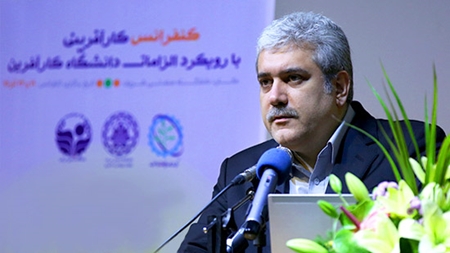Sattari on the Conference of Entrepreneurship with the Approach of Requirements of the Entrepreneur University:
Startups are the best infrastructures for return of students to the country
Startups are the best infrastructures for return of students to the country

According to the public relations and information center of the Vice-Presidency for science and technology affairs, Sorena Sattari, the vice president for science and technology affairs, pointed out the need for planning in the entrepreneurship field on the conference of entrepreneurship with the approach of requirements of the entrepreneur university, stating: in the beginning of the Islamic revolution of Iran, there were 270 thousand students in the country, 170 of whom were studying in the domestic universities and 100 were studying abroad. However, 57 thousand of these students were in the United States, in a way that they formed the largest colony of international students in America.
Increased Number of Students Will Have No Impact on the GDP of the Country
The vice president for science and technology affairs continued: today, we have four million and 700 thousand students in the country and 47 thousand students studying abroad. Therefore, we have less students studying abroad, compared to Saudi Arabia, India and China. As a result, we can observe that increased number of students in the country has had no effect on the GDP of Iran. Meanwhile, Iran has ranked 4th in the world in terms of training engineers and graduates engineers in the world, which is equal to the United States.
Head of the national elites foundation mentioned that the entrepreneurship ecosystem must be evaluated, expressing: therefore, we need to identify the problems in this structure, which have led to lack of impact of higher education on the GDP of the country. In this regard, the main problem is lack of an entrepreneurship ecosystem. In 2015, a report and book with the title of “Recognition of Silicon Valley” was published with the support of the Vice-Presidency for science and technology affairs and some questions, such as why the Silicon Valley is only in California, were answered the results showed that formation of an ecosystem is a logical solution. In fact, the thinking approach, culture and creative human resource lead to the creation of this ecosystem, which can result in the establishment of venture capitals and presence of related funds.
The Solution for Education Problems Is Not Money
Sattari also asserted: we need to reduce dependency on oil-based economy and not to regard financial solutions for education problems since the government budget is not low in these areas. In general, research needs creativity, thinking and innovative human resource, all of which can be found in an entrepreneurship ecosystem.
Sattari also explained about the developments in the educational methods of the world, conveying: as observed, the educational methods of the world have undergone serious changes and education is considered to be related to economy. However, there are some problems in the education system of other countries. Even in America there is no successful education system and 100% of PhD students of this country are foreigners, and they use hidden weapons such as H1 visa.
Improvement of Economy Requires the Formation of an Entrepreneurship Ecosystem
The vice president for science and technology marked that the entrepreneurship ecosystem must be modified in the country. In this regard, he added: use of government budget in research is destructive and destroys innovation, similar to the destruction of creativity by employment. In fact, students must play a role in improvement of economy of the country, which requires the establishment of an entrepreneurship ecosystem. Meanwhile, quality must also be taken into account, so that each student that enters in universities can act as a bomb in economy. The top universities of the world have been successful using the same ecosystem.
Sattari also mentioned that universities must have their independent income basket, expressing: universities can act independently and have assets in selling of technology and startups. This can be observed in Sharif University of Technology, which can be regarded as an entrepreneurship model for other universities in the country. The private sector is investing in the surroundings of Sharif University of Technology, where we can see startup and accelerator colonies. Therefore, the private sector can accelerate the development of this field by investing in startups since startups are the best infrastructure for returning students to the country due to high incomes. New businesses for young manpower can lead to the creation of high added value. The volume of international investment in this area is increasing as well since we have recognized the importance of this subject. Therefore, we need to use these opportunities and make fundamental changes in the education attitude and system of the country.
Sattari regarded the strengthening of interdisciplinary fields to be significantly important. In this regard, he expressed: today, there is no distance between interdisciplinary fields and universities must be a part of the society.
Sattari also visited the technology service center, science and technology club and test and evaluation laboratory of equipment network of Sharif University of Technology. During this visit, Sattari was accompanied by Mahmoud Sheikh Zeinoddin, deputy of technology innovation and commercialization, Parviz Karami, secretary of knowledge-based economy, technology and science development headquarter, Ali Morteza Birang, head of the international science and technology interaction center, and Mahmud Fotuhi Firuzabad, president of Sharif University of Technology.




comment